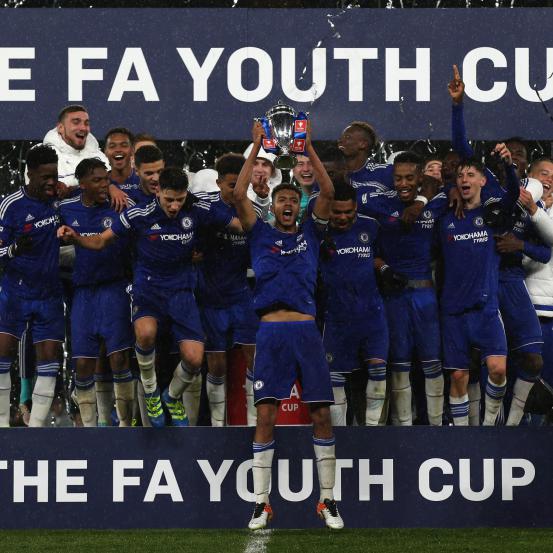- Commissioner’s statement on Ventura, Marte
- Ronnie O’Sullivan: Masters champion ‘felt so vulnerable’ in final
- Arron Fletcher Wins 2017 WSOP International Circuit Marrakech Main Event ($140,224)
- Smith challenges Warner to go big in India
- Moncada No. 1 on MLB Pipeline’s Top 10 2B Prospects list
- Braves land 2 on MLB Pipeline’s Top 10 2B Prospects list
- Kingery makes MLB Pipeline’s Top 10 2B Prospects list
- New Zealand wrap up 2-0 after Bangladesh implosion
- Mathews, Pradeep, Gunathilaka to return to Sri Lanka
- Elliott hopes for rain for Poli
Chelsea’s History Boys Show Their Substance in Youth Cup Final Win
- Updated: April 27, 2016

STAMFORD BRIDGE, London — Chelsea’s youth team made history on Wednesday when they became the only side since the Manchester United team of the 1950s to win three FA Youth Cups on the bounce.
That’s five in seven seasons for the Blues, reinforcing just how dominant the club has become in youth football.
Facing Manchester City—the Blues’ same opponents at this stage last year—this was a different sort of Chelsea display to those we’ve seen in the past.
In 2015, it was about the likes of Izzy Brown, Charly Musonda and Dominic Solanke getting the crowd off their feet. Those players have the flair and panache to overcome City, but the class of 2016 showed there was substance beyond that individual brilliance.
As a spectacle, fans and neutrals will probably come away feeling underwhelmed by Chelsea’s 3-1 victory (4-2 on aggregate). They shouldn’t. Chelsea’s winning display was about playing football in the right sort of way.
Joe Edwards’ side showed a level of composure and game management we’re not supposed to associate with youth footballers. It was a case of wise heads on young shoulders, which is where the biggest difference was between the teams.
That’s what impresses most about what Chelsea are achieving right now. They’re producing a generation of players who don’t just play on instinct; they take it to the next level by applying what they’re taught on the training pitch into game situations. We call that becoming better players.
That …
continue reading in source www.bleacherreport.com
